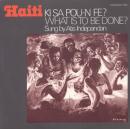Papa-m monté oun bato, yo di nou li alé Naso
Papa-m monté oun bato, yo di nou li alé Naso
La-l chaché la vi, pou nou ki dèyè
pa ginyin ni manjé ni lajan
Manman té oblijé chiré oun vie ròb
Pou-l té fè oun kazak pou Ti Rouj
Pou-l té fè oun kazak pou Ti Rouj (1)
Sa fè déja lontan lontan
depi papa nou té pati
depi papa nou té pati
Makout sézi tè-l, mouche te bouazé (2)
li pa jan-m voyé nouvèl banou
Manman té oblijé lè Ti Rouj chapé
voye-l reté ak youn gran nèg la vil
voye-l reté ak youn gran nèg la vil
Pèson-n pa jahmin konnin
sa papa nou dévéni
manman min-m soti mouri
anba oun mové tous
La mizè blayi kò li,
sou nou tout lan péyi-a
sou nou tout lan péyi-a
fos kouray-nou pi gro nèg
pasé dlo ki sot lan je-n
Papa-m monté oun bato, yo di nou li alé Naso
La-l chaché la vi, pou nou ki dèyè
pa ginyin ni manjé ni lajan
Manman té oblijé chiré oun vie ròb
Pou-l té fè oun kazak pou Ti Rouj
Pou-l té fè oun kazak pou Ti Rouj (1)
Sa fè déja lontan lontan
depi papa nou té pati
depi papa nou té pati
Makout sézi tè-l, mouche te bouazé (2)
li pa jan-m voyé nouvèl banou
Manman té oblijé lè Ti Rouj chapé
voye-l reté ak youn gran nèg la vil
voye-l reté ak youn gran nèg la vil
Pèson-n pa jahmin konnin
sa papa nou dévéni
manman min-m soti mouri
anba oun mové tous
La mizè blayi kò li,
sou nou tout lan péyi-a
sou nou tout lan péyi-a
fos kouray-nou pi gro nèg
pasé dlo ki sot lan je-n
Notes:
(1) “Ti Rouj” translates "little red", describing the little brother‘s skin color.
(2) “Tonton Macoute” translates "old uncle with a pack on his back" but it is the folkloric expression for the private army created by the Duvalier dictatorship for the political repression of the Haitian masses.
“Tonton Macoute”, o l’“Uomo Nero”, o il “Babau”, o “boogeyman” è una figura fantastica che si ritrova in molte tradizioni… Purtroppo ad Haiti questa figura cattiva e crudele era fin troppo “incarnata”, dato che era il nomignolo affibiato – non a caso – alla feroce “Milice de Volontaires de la Sécurité Nationale”, la polizia segreta e milizia privata della famiglia Duvalier, i dittatori dell’isola fino al 1986, anno della rivolta popolare che li cacciò. Allora, mentre “Baby Doc” Duvalier trovò rifugio in Francia, i capi dei “Tonton Macoutes”, come Luckner Cambronne ed Emmanuel Constant, responsabili di omicidi, stragi, torture e quant’altro, ripararono in Florida dove hanno vissuto tranquillamente, sotto la protezione del governo USA…
(1) “Ti Rouj” translates "little red", describing the little brother‘s skin color.
(2) “Tonton Macoute” translates "old uncle with a pack on his back" but it is the folkloric expression for the private army created by the Duvalier dictatorship for the political repression of the Haitian masses.
“Tonton Macoute”, o l’“Uomo Nero”, o il “Babau”, o “boogeyman” è una figura fantastica che si ritrova in molte tradizioni… Purtroppo ad Haiti questa figura cattiva e crudele era fin troppo “incarnata”, dato che era il nomignolo affibiato – non a caso – alla feroce “Milice de Volontaires de la Sécurité Nationale”, la polizia segreta e milizia privata della famiglia Duvalier, i dittatori dell’isola fino al 1986, anno della rivolta popolare che li cacciò. Allora, mentre “Baby Doc” Duvalier trovò rifugio in Francia, i capi dei “Tonton Macoutes”, come Luckner Cambronne ed Emmanuel Constant, responsabili di omicidi, stragi, torture e quant’altro, ripararono in Florida dove hanno vissuto tranquillamente, sotto la protezione del governo USA…
inviata da Alessandro - 1/3/2010 - 15:23
Lingua: Inglese
Traduzione inglese dal libretto che accompagna il disco.
MY FATHER LEFT ON A BOAT
My father left on a boat.
I've heard he went to Nassau
To find some way to make a living,
Because in Haiti we have no food or money.
My mother is so poor she had to cutup an old dress
To make a pair of pants for Ti Rouj
My father worked hard to provide for us.
But the Tonton Macoutes came and stole his land,
He had no choice but to flee.
And still we have no news from him.
My mother had to send the youngest child, Ti Rouj,
To work hard for no pay in the big house in town.
Nobody knows where my father is.
My mother passed away, after suffering from tubercolosis
Misery lies on all of us in my country,
But our courage is stronger than all our tears.
My father left on a boat.
I've heard he went to Nassau
To find some way to make a living,
Because in Haiti we have no food or money.
My mother is so poor she had to cutup an old dress
To make a pair of pants for Ti Rouj
My father worked hard to provide for us.
But the Tonton Macoutes came and stole his land,
He had no choice but to flee.
And still we have no news from him.
My mother had to send the youngest child, Ti Rouj,
To work hard for no pay in the big house in town.
Nobody knows where my father is.
My mother passed away, after suffering from tubercolosis
Misery lies on all of us in my country,
But our courage is stronger than all our tears.
inviata da Alessandro - 1/3/2010 - 15:24
×
![]()





Parole da una poesia di tal Dr. Z.
Musica di Toro, Atis Indepandan e Pierre Michel Augustin
“Here is a story repeated often in Haitian life. The dictator's army is permitted to arbitrarily sieze land from the peasants, leaving them to starve. Because there are no jobs, the father is often forced to go elsewhere to look for work, and the hardships he faces often prevent him from returning home. The mother is left alone with starving children, which often forces her to send the youngest to work in the rich houses where they are paid only with a few scraps of food, a corner to sleep in, and beatings when they can't work hard enough, This picture will change when "our courage is stronger than all our tears."
(introduzione al brano dal libretto che accompagna il disco)